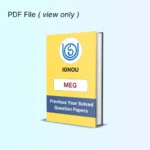IGNOU MEG-05 Block 3 Summary | Romantic Criticism
- Last Updated On August 14, 2025
Table of Contents
Here you will get the detailed summary of IGNOU MEG 5 Block 3 – Romantic Criticism.
We have provided the summary of all units starting from unit 1 to unit 4.
Introduction
IGNOU MEG-5 Block 3 focuses on Romantic Criticism, exploring the radical literary and philosophical shift that took place during the late 18th and early 19th centuries in Europe. Romanticism marked a break from the rigid formalism of Neoclassicism and emphasized individual imagination, emotion, nature, and the creative spirit. This block focuses on the theoretical contributions of major English Romantic poets—William Wordsworth, Samuel Taylor Coleridge, and Percy Bysshe Shelley—who not only wrote groundbreaking poetry but also produced critical reflections on the nature and function of poetry. Through these writings, Romantic criticism redefined the role of the poet, the function of poetry, and the relationship between art and truth.
Unit 1 – Romanticism
This unit outlines the historical, philosophical, and aesthetic context of Romanticism as a literary movement.
Key characteristics of Romanticism:
-
Emphasis on emotion, imagination, and subjectivity.
-
Celebration of nature as a source of beauty, truth, and inspiration.
-
Rejection of Neoclassical order, decorum, and rationalism.
-
Focus on the individual, especially the artist as a visionary or prophet.
-
A belief in spontaneous expression and originality.
-
Interest in the supernatural, mystery, and the sublime.
Historical influences:
-
The French Revolution, with its ideals of liberty and equality.
-
Industrialization, which led to alienation and nostalgia for nature.
-
Philosophers like Rousseau and Kant, who emphasized individual perception and imagination.
Romanticism was not just a literary style but a worldview that sought to liberate art and humanity from mechanistic constraints and moral rigidity.
Unit 2 – Wordsworth: Preface to the Lyrical Ballads
This unit focuses on William Wordsworth’s seminal preface (especially the 1800 and 1802 versions), which served as a manifesto of Romantic poetry.
Major arguments in the Preface:
-
Poetry should be written in the language of ordinary people.
-
The subjects of poetry should be common life and humble rural characters.
-
Poetry is the spontaneous overflow of powerful feelings, originating from emotion recollected in tranquility.
-
The poet is not just an entertainer but a “man speaking to men”—more sensitive, imaginative, and emotionally aware than others.
Wordsworth rejected:
-
Artificial poetic diction.
-
The mechanical imitation of classical rules.
-
The elitist and intellectualized tone of earlier poetry.
Wordsworth’s emphasis on authentic human emotion, simplicity, and natural beauty marked a radical departure from previous critical traditions and laid the foundation for a more democratic and expressive form of poetry.
Unit 3 – Coleridge: Biographia Literaria
In this unit, the focus shifts to Samuel Taylor Coleridge’s critical prose, especially Biographia Literaria (1817), a highly complex and philosophical work combining autobiography, literary theory, and metaphysics.
Coleridge’s contributions include:
-
Theory of the Imagination:
-
Distinguished between:
-
Primary Imagination – the living power of human perception.
-
Secondary Imagination – the creative faculty of the poet, echoing and reshaping the primary imagination.
-
Fancy – a mechanical or decorative faculty, inferior to imagination.
-
-
-
Criticism of Wordsworth’s ideas:
-
While he supported Wordsworth’s poetic reforms, he critiqued the overemphasis on simplicity and ordinary language.
-
Argued for the complexity of poetic diction and the importance of intellectual and symbolic elements in poetry.
-
-
Defense of Shakespeare:
-
Rejected neoclassical rules (like the unities) and celebrated Shakespeare’s organic unity and psychological depth.
-
Coleridge moved Romantic criticism toward a more philosophical and idealist direction, highlighting the mystical, symbolic, and synthetic power of poetry and the imagination.
Unit 4 – P. B. Shelley: A Defence of Poetry
This unit examines Percy Bysshe Shelley’s essay, written in 1821 but published posthumously in 1840. It is a passionate, idealist defense of poetry’s moral and spiritual power.
Key ideas from Shelley:
-
Poets are the unacknowledged legislators of the world:
-
Poets shape moral consciousness and inspire social transformation.
-
-
Poetry creates sympathy, refines emotions, and promotes human solidarity.
-
Imagination is essential for empathy, creativity, and moral understanding.
-
Argues that poetry and the arts are central to civilization—they humanize, civilize, and elevate.
Shelley’s poetic theory is rooted in idealism, Platonism, and a belief in beauty as truth. His essay presents poetry as a divine force, transcending rationalism and materialism, with the power to shape history, politics, and ethics.
